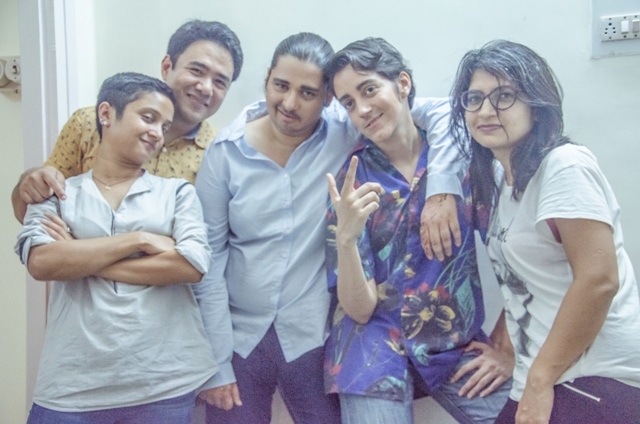For much of its history, drag has been the preserve of men – a culture where they dress up as women to entertain and express themselves. The reverse – women dressing up as men in these exaggerated, gender-fluid ways – has so far been little explored. But Tape is seeking to set right that imbalance by carving out specifically such a niche – where women dress up as men, in an over-the-top manner to brandish their masculinity and inhabit a new kind of stagey persona.
The project was born from an Open Mic night hosted in January by Gaysi, an online platform for those who identify as queer, but which also organises offline events. “We started having these conversations,” said Priya Gangwani, the site’s founder. “You watch men celebrate and have exaggerated fun but how often do you see women do that? How often do you see women parody or challenge gender roles?”

Drag queens are more visible in the cultural fabric. And though there may be visibly butch or masculine women, drag kings connotes an entirely different identity altogether. “They’ve just been invisible,” said Gangwani, pointing out that pride events might see the odd drag queen, but rarely, if ever, any drag kings. “Our idea is to give people a sneak peak into drag culture and initiate a dialogue.”
The 1.5 hour-long show will be performed twice on September 12 at a venue in Mumbai, and tickets for the 100-seater venue have already sold out for one show.
The performance, put together by Gaysi and theatre group Patchworks Ensemble at a Lower Parel location, will see professional theatre artists explore the contours and configurations of drag king culture in large part through the beloved persona of late film star Shammi Kapoor.
“There is a certain empathy to his masculinity, a likeability,” said Vikram Phukan, a playwright and critic who wrote the piece. “We wanted to pay homage to it and parody it as well.”
In 1956, on the set of the film Rangeen Raatein, Geeta Bali met Shammi Kapoor. He was the film’s leading man. She, oddly enough, happened to be playing a man in that movie. The two would later fall in love and marry. It’s a little anecdote Phukan pulled up while talking about Tape. And though it has no direct bearing on the performance itself, it really puts front and centre the overlapping terrain between gender and performativity, the ground that Tape itself runs over. “There is a certain wackiness about the Shammi Kapoor persona,” continued Phukan. “We wanted to restore his iconicity.”
Following the King
The word Tape is a reference to the taping of breasts by female performers for such shows. In the West, Elvis Presley is one visibly referenced popular culture figure in drag king culture. With elaborate mutton chops, performative zest and over-the-top clothing, the rock and roll star is an easy fallback for drag’s innately exaggerated stylings.
Overall, drag culture has some easily recognisable markers – where a kind of florid, over-the-topness is key, and more is more. And the culture is as much about entertainment as it is about self-expression.
“As a performer it’s a great mask to play with,” said one of the performers, Puja Sarup, of the opportunity to play an overly masculine persona. “It’s been so exciting creating this imaginary world.” Sarup spoke of one of the characters she plays: an obnoxious man with antiquated ideas of gender. “What’s great about playing any character is that you’re not judging yourself.”










